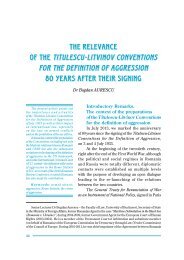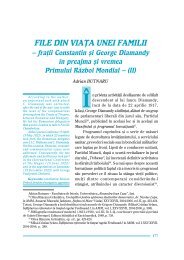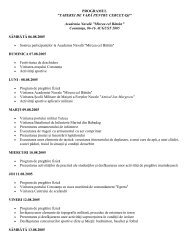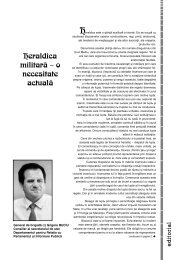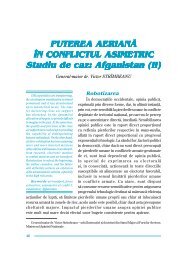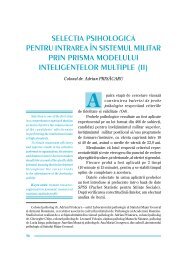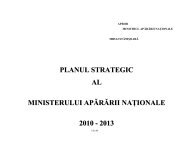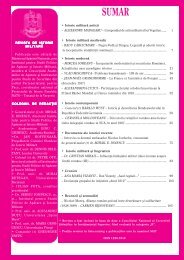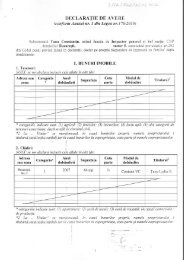Create successful ePaper yourself
Turn your PDF publications into a flip-book with our unique Google optimized e-Paper software.
this period, the French military industry struggled<br />
to secure some orders. Thus, since the spring of<br />
1913 Schneider-Creusot intensified its efforts to<br />
secure in her favour orders of machine guns from<br />
the Romanian government and against the<br />
German Krupp. It coupled that effort by financing<br />
various campaigns in the Romanian press against<br />
the German products. 45<br />
Another French company Saint-Chamond<br />
struggled to secure an order for 4 Romanian<br />
destroyers in her favour and against Krupp. 46 On<br />
the eve of World War I the competition between<br />
the French and German military industry goes on<br />
relentlessly in the country. However, the German<br />
primacy in the arms sector is indisputable. The<br />
possibility of selling to the Romanian army 10<br />
artillery units by the French Schneider in June<br />
1914 cannot be considered as success when the<br />
reorganization of that army demanded the buying<br />
of 120 artillery units that would be ordered to<br />
German industry. 47<br />
Conclusion<br />
A few years before the World War I, the military<br />
industrial and generally the political antagonism<br />
of France and Germany in the Balkans and<br />
particularly Greece and Romania consists an<br />
important chapter not only for the European<br />
historical reality, but also for the local history of<br />
Southeast Europe.<br />
This antagonism besides its political and<br />
diplomatic formation that, of course, originated<br />
from the French-German collision of 1870-71 and<br />
the creation of the Bismarck system in Europe<br />
took, from the end of the XIX th century and<br />
particularly the beginning of the XX th century, a<br />
more concrete financial and also industrial<br />
economic shape.<br />
Apart from the fact that the foreign policy of<br />
the two countries, France and Germany, was not<br />
always considered identical with the policy of the<br />
financial credit and banking cycles of these<br />
countries, which of course pushed forward<br />
common efforts and initiatives for mutual benefit,<br />
soon this financial weapon was to be used directly<br />
or indirectly for its promotion, as well as for specific<br />
economical interests.<br />
The value of this weapon was known to both<br />
governments. Their capability to provide or deny<br />
the permit for investing foreign bonds in their<br />
national money market gave them the power to<br />
embody this factor as a crucial element of their<br />
foreign policy. Thus, the permit could be followed<br />
by the desire of obtaining economic advantages<br />
and political exchanges.<br />
In the case we have reported but generally also<br />
in the matter of foreign borrowing, as much as in<br />
the Balkans as in the Ottoman Empire, the<br />
collaboration between the banks of the two sides<br />
for pure technical reasons –particularly that is the<br />
protection of the clients-investors from probable<br />
risk of bankrupt of the borrowers – was accepted<br />
by both governments. 48<br />
This collaboration was of course as it appeared<br />
especially in the case of Romania, mostly desirable<br />
from the bank foundations of both sides that were<br />
also involved for reasons of common financial profit.<br />
However, from the end of the XIX th century,<br />
the promotion of industrial orders started to play a<br />
more significant role in the contracts of foreign<br />
loans. The German banks, which were closely<br />
connected with certain industrial centers of their<br />
country, were trying to push forward and ensure<br />
more orders for their national industry from the<br />
countries that borrowed.<br />
The financial weapon would be used by the<br />
French with a particularly pressing way and mainly<br />
with the stimulation of the French Foreign Affairs<br />
Office and it is obvious that this tactic proved itself<br />
quite effective in many cases. The principal<br />
doctrine: the orders must be made to the industries<br />
and companies of the country that covered<br />
financially the loan.<br />
The harsh antagonism of the two important<br />
war industries – the German Krupp and the French<br />
Schneider – as much as in Turkey as in the Balkans<br />
and of course in the countries that have caught<br />
our interest, the support of the correlating<br />
governments and the implication of bank cycles<br />
consists a characteristic example.<br />
Foe several years prior to World War I, Greece<br />
and Romania became the theater of this strong<br />
political-military and economical antagonism.<br />
From the beginning of the XX th century, Greece<br />
enrolled gradually in the French influence sphere<br />
due to the French capital, that flooded the country<br />
and by the principle of “coherent loan”, meaning as<br />
mentioned previously, the obligation of the country<br />
that borrows to order industrial products from the<br />
lending country’s industries, a great number of<br />
military materials purchases were made in France.<br />
On the contrary, Romania traditionally under<br />
the financial and economic influence of Germany<br />
would turn to the latter for covering her military<br />
42 ����� Review of Military History �����



